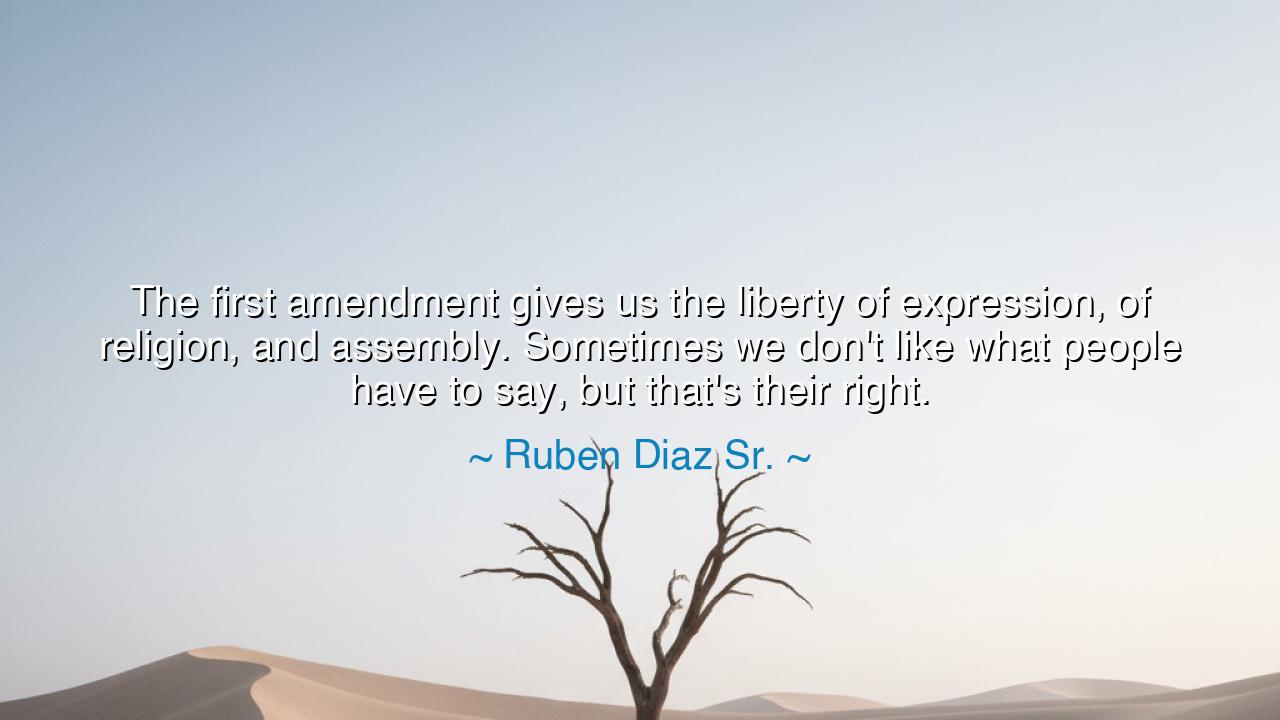
The first amendment gives us the liberty of expression, of
The first amendment gives us the liberty of expression, of religion, and assembly. Sometimes we don't like what people have to say, but that's their right.






"The first amendment gives us the liberty of expression, of religion, and assembly. Sometimes we don't like what people have to say, but that's their right." These words from Ruben Diaz Sr. echo with the wisdom of freedom and the sacredness of individual rights, a principle that resonates deeply in any society that values justice and equality. The First Amendment of the United States Constitution has long been a symbol of liberty, enshrining the rights to freedom of speech, religion, and assembly. Diaz’s statement reminds us of the core truth that, while we may not always agree with the opinions and beliefs of others, we must respect their right to express them. Freedom—in its truest form—is not about protecting only the ideas we agree with, but about allowing all voices to be heard.
In the ancient world, this concept was also revered. The great philosophers of Greece, particularly Socrates, championed the value of free thought and discourse. Socrates was sentenced to death for corrupting the youth of Athens with his questioning of traditional values and the gods, yet he stood by his belief that the pursuit of knowledge and truth was a noble endeavor. His defense of free expression, even in the face of the death penalty, is a testament to the importance of allowing all ideas, even those deemed unpopular or controversial, to be freely discussed. In this way, Socrates exemplified the very essence of freedom of expression—a willingness to stand for truth despite the cost, recognizing that society’s growth comes through the exchange of diverse ideas.
Similarly, Rome, while known for its military might, also placed great importance on public assembly and debate. The Senate was the heart of political discourse, where citizens (or their representatives) could speak freely and express their concerns and beliefs. While the Senate was not always a place of democratic harmony, it reflected a commitment to dialogue, a belief that every citizen had the right to have their voice heard. In Rome, public speeches were not only a means of political action but also an important expression of individual freedom and the right to speak openly. Even when the voices of dissent were silenced, these assemblies were crucial in shaping the course of Roman governance.
In modern times, Diaz’s words echo the struggles and triumphs of movements for freedom and justice. One of the most defining moments in American history occurred during the Civil Rights Movement in the 1960s, when figures like Martin Luther King Jr. stood firm in their right to express their vision for a more just society. In his Letter from Birmingham Jail, King wrote of the importance of peaceful protest and freedom of expression in the face of oppression. While many of King’s ideas were met with fierce resistance, he held fast to the belief that expressing truth, no matter how uncomfortable or divisive, was essential to the fabric of justice. In this context, the First Amendment was not merely a legal right but a moral imperative, a means of fostering social change.
Another example is the fight for religious freedom in early American history. The Puritans, fleeing religious persecution in England, sought the right to practice their religion freely in the New World. Yet, even as they sought this freedom, they were not always willing to extend it to others. It wasn’t until Roger Williams, a religious dissenter, founded the colony of Rhode Island in 1636 that the principle of religious liberty truly began to take shape in American governance. Williams’ belief in the right of all individuals to practice their faith without interference from the state was a radical departure from the religious intolerance that had previously existed. His stand for freedom of religion laid the foundation for the more inclusive First Amendment principles that we hold today.
The lesson in Diaz’s words and the lessons of history are clear: freedom of expression is a fundamental right that transcends personal preferences and ideological differences. Just as Socrates was willing to die for the pursuit of truth, and King for the rights of the oppressed, we too must stand firm in our belief that all people have the right to express their ideas, even when they challenge the status quo. Freedom of speech, religion, and assembly are not just legal protections but moral obligations to ensure that every voice can be heard and that no one is silenced simply because their views are unpopular or uncomfortable.
In our own lives, we must embrace these principles by respecting the rights of others to express themselves, even when we disagree. Tolerance and understanding are not about silencing opposing views but about engaging with them in a spirit of dialogue and respect. We must be willing to listen to voices that challenge us, for it is through this exchange of ideas that society grows and evolves. Let us honor the First Amendment not only as a legal right but as a moral principle that fosters a healthy, dynamic, and just society.






AAdministratorAdministrator
Welcome, honored guests. Please leave a comment, we will respond soon